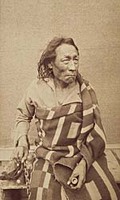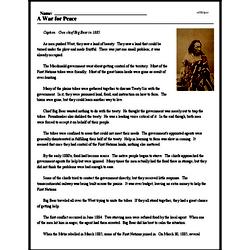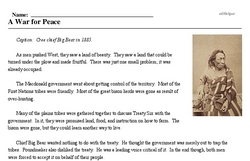A War for Peace
Caption: Cree chief Big Bear in 1885.
As men pushed West, they saw a land of beauty. They saw a land that could be turned under the plow and made fruitful. There was just one small problem; it was already occupied.
The Macdonald government went about getting control of the territory. Most of the First Nations tribes were friendly. Most of the great bison herds were gone as result of over-hunting.
Many of the plains tribes were gathered together to discuss Treaty Six with the government. In it, they were promised land, food, and instruction on how to farm. The bison were gone, but they could learn another way to live.
Chief Big Bear wanted nothing to do with the treaty. He thought the government was merely out to trap the tribes. Poundmaker also disliked the treaty. He was a leading voice critical of it. In the end though, both men were forced to accept it on behalf of their people.
The tribes were confined to areas that could not meet their needs. The government's appointed agents were generally disinterested in fulfilling their half of the treaty. Help in learning to farm was slow in coming. It seemed that once they had control of the First Nations lands, nothing else mattered.
By the early 1880's, food had become scarce. The native people began to starve. The chiefs approached the government agents for help but were ignored. Many times the men actually had the food there in storage, but they did not think the problems were bad enough to ease.
Some of the chiefs tried to contact the government directly, but they received little response. The transcontinental railway was being built across the prairie. It was over budget, leaving no extra money to help the First Nations.




